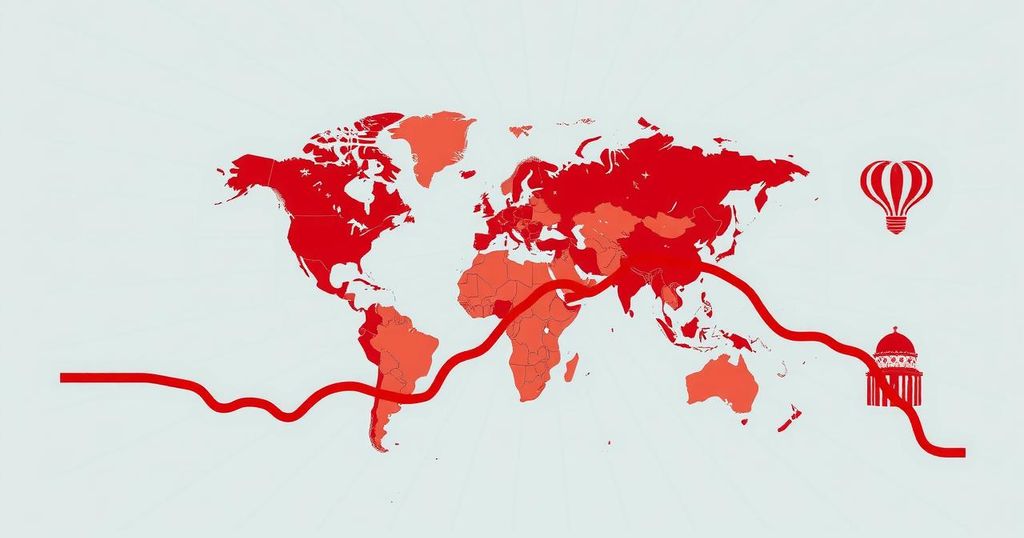Global Democracy Declines for Eighth Consecutive Year, Report Reveals

The decline of global democracy continues for the eighth year, marked by increased election fraud, disinformation, and voter disengagement. The International IDEA’s report cites a drop in eligible voter turnout and growing contestations of electoral results, highlighting a significant crisis in democratic integrity. Regions including Africa and the Americas show varied trends, with some countries improving while others face serious democratic challenges.
Global democracy has been in a state of decline for eight consecutive years, with 2023 representing the most significant drop in election integrity and parliamentary oversight observed over the past fifty years. This deterioration has been influenced by government intimidation, foreign interference, rampant disinformation, and the emerging misuse of artificial intelligence during electoral campaigns, according to the International Institute for Democracy and Electoral Assistance (International IDEA). Particularly concerning is the fact that only 55.5% of eligible voters participated in elections in 2023, a substantial decrease from 65.2% in 2008, highlighting a troubling trend in voter engagement worldwide. The report indicates that nearly one-third of elections in this period were contested in some manner, emphasizing growing dissatisfaction with electoral outcomes.
The organization reported that an alarming 47% of countries have seen declines in essential democratic metrics over the last five years. This marks a significant setback, particularly as the conditions surrounding elections have become increasingly adversarial. In 2023, the situation reached a crisis point, with numerous elections facing allegations of foreign meddling and the proliferation of false information that undermined public trust. Moreover, the scope of these declines was broad, affecting both historically stable democracies and nations with pre-existing vulnerabilities.
Regions such as Africa have displayed a more stable democratic performance overall. Nonetheless, countries like Burkina Faso exemplify the challenges posed by military coups and governance failures, contributing further to the erosion of democratic norms. In contrast, improvements in democratic practices have been noted in nations such as Burundi and Zambia. In Western Asia, the performance was dismal, while Europe experienced widespread setbacks, particularly concerning civil liberties and the rule of law, although positive developments were observed in Montenegro and Latvia.
The Americas have managed relative stability, yet significant declines have been observed in countries like Guatemala, Peru, and Uruguay, particularly regarding rule of law issues. The Asia-Pacific region demonstrates a mixture of stability and decline; however, significant regressions have been noted in Afghanistan and Myanmar amidst ongoing political unrest.
“Elections remain the single best opportunity to end democratic backsliding and turn the tide in democracy’s favor,” stated Kevin Casas-Zamora, Secretary-General of International IDEA. The findings of International IDEA’s Global Report on the State of Democracy serve as a pertinent reminder of the urgent necessity to reinforce democratic engagement and integrity in electoral processes worldwide.
The report released by the International Institute for Democracy and Electoral Assistance (International IDEA) highlights a significant decline in democratic practices and electoral credibility worldwide, a situation that has persisted for the past eight years. The findings underscore the challenges that many countries face concerning the integrity of their elections, including external influences and the manipulation of information. The importance of maintaining robust democratic structures is critical in countering the disturbing trends noted in this report, as democracy itself is at stake across numerous regions globally.
The continuous decline of democracy, as evidenced by the Global Report on the State of Democracy, raises significant concerns regarding the future of electoral integrity and governance worldwide. With a record number of contested elections and a dramatic fall in voter turnout, it is imperative for nations to undertake measures to combat disinformation, promote civic engagement, and ensure that electoral processes remain transparent and credible. Ultimately, the future of democracy hinges on the successful management and oversight of elections, which must be safeguarded against both internal and external threats.
Original Source: apnews.com







